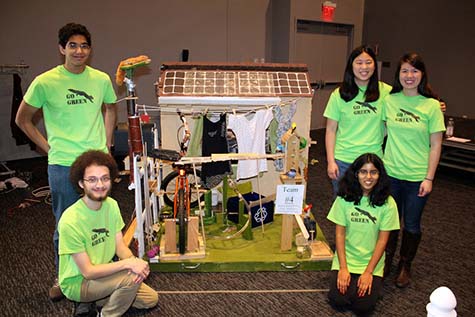A Washington University in St. Louis team won the People’s Choice and second place awards at the 2014 Rube Goldberg Machine Contest. The national competition was held at the Center of Science and Industry in Columbus, Ohio, earlier in April.
The contest is named after the late cartoonist Reuben Lucius Goldberg, who died in 1970. For 55 years, the engineer-turned-cartoonist drew machines and contraptions that satirized the technology-infatuated culture of his time. His drawings, using simple gadgets and household items already in use, were incredibly complex, but had an ingenious, logical progression to them.
In the words of the inventor, the machines were a “symbol of man’s capacity for exerting maximum effort to achieve minimal results.”
This year’s challenge was to zip a zipper. Each team received a complimentary kit of three by YKK, the international zipper manufacturer.
WUSTL’s Green Machine featured solar panels, a bike, windmills, laundry drying on a clothesline, two gardens — one of which (window-box flowers) won the Best Single Step Award — and lots of backyard wildlife.
“The machine is built mostly of recycled materials,” said Amy Patterson, a junior majoring in biology. “The clothes on the clothesline and the squirrel-garden gnome are from the Trading Post on the South 40. The wind turbine is made of PVC found in a university dumpster, and the heads of the tape-measure flowers are made from insulation found in a dumpster. We use a lot of old packaging materials in our machines, such as empty used soda bottles and used cereal boxes. One of the birds and the material for the curtains came from Goodwill.“
“At the end,” Patterson said, “a squirrel jumps onto the solar-paneled roof, slides into the gutter, pushing down a lever, triggering a mousetrap, pulling out a pin, allowing a weight to drop, zipping the zipper.”

The machines are judged on story telling, complexity (they must have at least 20 steps), machine flow (can you follow what’s happening), humor, and the use of everyday items for tasks for which they were not intended.
Teams lose points if a team member has to intervene to nudge something that is stuck or if a moveable part “leaves the machine.”
“This year, we had one perfect run, and one run with two ‘touches,’ which actually isn’t bad,” Patterson said.